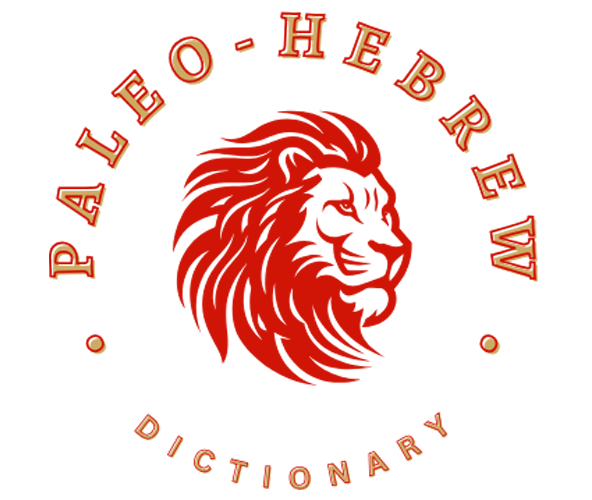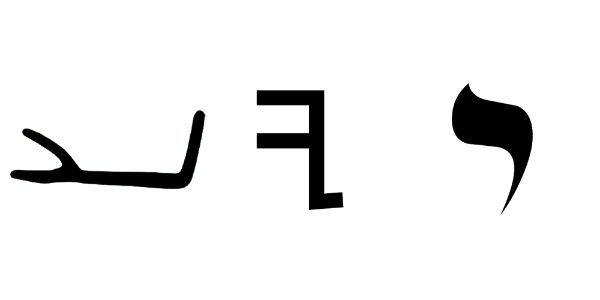The word alayashaā (𐤀𐤋𐤉𐤔𐤏) means “God is Deliverance” and combines the word 𐤀𐤋 (al) with 𐤉𐤔𐤏 (yashaā). 𐤀𐤋 (al) means male deity, God, goodly, great, idol, mighty one, power, strong. 𐤉𐤔𐤏 (yashaā) meaning to deliver, avenge, defend, deliverer, help, rescue, deliverance, salvation, safety, welfare, and safety.
The Paleo-Hebrew language or the original language of the Ābarayam is one spoken with an emphasis on the rauakh (breath, wind, spirit). With the language of the Ābarayam, each letter has a meaning and a number associated with it that adds meaning to each word they’re used with. Below you will be able to learn more about the letter in Ancient Hebrew, Yiddish Hebrew, Greek, and much more.
Letter Meanings
| Letter | Meaning |
|---|---|
| 𐤀 (a) – ah | Ox, strength, leader Prefix: Turns word into first-person |
| 𐤋 (l) – la | staff, goad, control, toward, protect, authority, bind, yoke, lead |
| 𐤉 (y) – ya | arm, hand, work, thrust, deed, make, throw, worship |
| 𐤔 (sh) – sha | teeth, eat, consume, destroy, bite, two, change, divide, press, repeat |
| 𐤏 (ā) – ā | eye, to see, experience, watch, heed, know, cover, color |
| Ābarayat Number | 509 = 1 (a) + 30 (l) + 10 (y) + 300 (sh) + 70 (ā) |
| Hebrew Gematria | |
| English Gematria | |
| Simple Gematria |
Based on the meaning of the letters the word could be defined as:
- Combines “Al” and “Yashaā”
- Deity of Salvation
- Deity of Deliverance
- God of Salvation
- God of Deliverance
- Deity is Salvation
- Deity is Deliverance
- God is Salvation
- God is Deliverance
- Combines “Alay” and “Shaā”
- Godlike outcry
- Godlike blindness
- Godly outcry
- Godly blindness
Definitions for 𐤀𐤋𐤉𐤔𐤏 / alayashaā
| Language | Word | Transliteration | Pronunciation | Definition |
|---|---|---|---|---|
| Ābarayat | 𐤀𐤋𐤉𐤔𐤏 | alayashaā | awl-ya-shaw-eh | God is Salvation Potentially written as alayashagh (pronounced: awl-ya-shawagh). |
| English | Elisha | Elisha | ih-lahy-shuh | Also Douay Bible, El·i·se·us [el-i-see-uhs]. a Hebrew prophet of the 9th century b.c., the successor of Elijah. 2 Kings 3–9. |
| Hebrew | אֵליָשַׁע | alyesha | al-yaw-shah' | Alysha |
| Arabic | ||||
| Greek |
Images for 𐤀𐤋𐤉𐤔𐤏 / alayashaā



Definitions for 𐤀𐤋𐤉𐤔𐤏𐤉 / alayashaāy
When adding the 𐤉 (yad) to the end of a word, it creates a possessive of the original word. It can either signify “my…” or identify a member of a nation. For example, 𐤏𐤁𐤓 (Ābar) is the progenitor, but 𐤏𐤁𐤓𐤉 (Ābaray) is the singular descendant of him also known as a Hebrew.
| Language | Word | Transliteration | Pronunciation | Definition |
|---|---|---|---|---|
| Ābarayat | 𐤀𐤋𐤉𐤔𐤏𐤉 | alayashaāy | awl-ya-shaw-ehey | |
| English | ||||
| Hebrew | ||||
| Arabic | ||||
| Greek |
Images for 𐤀𐤋𐤉𐤔𐤏𐤉 / alayashaāy


Definitions for 𐤀𐤋𐤉𐤔𐤏𐤉𐤌 / alayashaāyam
When adding the 𐤌 (mayam) after the 𐤉 (yad) to the end of a word, it creates a plural of the original word. It can identify multiple members of a nation. For example, 𐤏𐤁𐤓 (Ābar) is the progenitor, but 𐤏𐤁𐤓𐤉𐤌 (Ābarayam) are the plural descendants of him also known as Hebrews.
| Language | Word | Transliteration | Pronunciation | Definition |
|---|---|---|---|---|
| Ābarayat | 𐤀𐤋𐤉𐤔𐤏𐤉𐤌 | alayashaāyam | awl-ya-shaw-eh-yawm | |
| English | ||||
| Hebrew | ||||
| Arabic | ||||
| Greek |
Images for 𐤀𐤋𐤉𐤔𐤏𐤉𐤌 / alayashaāyam


Definitions for 𐤀𐤋𐤉𐤔𐤏𐤉𐤕 / alayashaāyat
When adding the 𐤕 (tau) after the 𐤉 (yad) to the end of a word, it creates a plural of the original word. It identifies the language or a sign of a nation’s existence. For example, 𐤏𐤁𐤓 (Ābar) is the progenitor, but 𐤏𐤁𐤓𐤉𐤕 (Ābarayat) is the language of him also known as Paleo-Hebrew language.
| Language | Word | Transliteration | Pronunciation | Definition |
|---|---|---|---|---|
| Ābarayat | 𐤀𐤋𐤉𐤔𐤏𐤉𐤕 | alayashaāyat | awl-ya-shaw-eh-yawt | |
| English | ||||
| Hebrew | ||||
| Arabic | ||||
| Greek |
Images for 𐤀𐤋𐤉𐤔𐤏𐤉𐤕 / alayashaāyat


Classification
You can continue your studies of the words by viewing Strong’s entries for:




